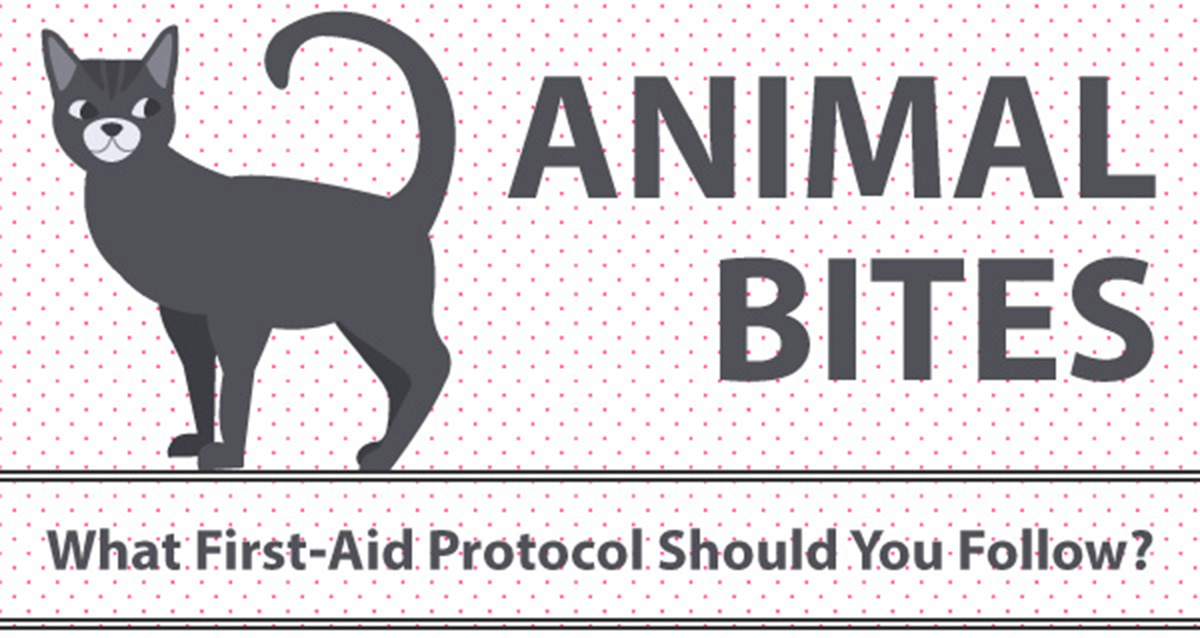Table of Contents
You or someone around you has just been bitten by an animal or another human. What's next? Immediately post-bite, it is always a good idea to soak any wound that has left a puncture (which won't always be immediately apparent to the naked eye) in a large amount of hot water with soap, or even better, an enzyme-based washing powder. If you have antibiotic ointment on hand, apply it. You can also opt to use peroxide or iodine.
If the wound is large and bleeding, apply a sterile compress or at least a clean towel to attempt to stop the bleeding. If the wound is small but deep, as might be the case with ferret or cat bites, pinch the skin to allow blood — and the dirt that entered the body with the bite — to escape.

Note: If you have received a snake bite and don't know what kind of snake bit you, the advice is different. You should restrict the mobility of the affected site to an absolute minimum, and generally avoid walking or moving around, in case the bite was venomous.
Do You Need Treatment For Your Bite Wound?
People in good health who have received small bites from domestic, indoor, and fully immunized mammals may choose to skip seeing a doctor, if they've also had a tetanus shot within the last five years. They should keep a close eye on the wound and seek medical attention if they do spot signs of infection, such as a fever, redness around the site, pus, or increased pain.
Those who have been bitten by animals of unknown immunization status, who have sustained a serious injury, whose bones may be broken, whose bleeding won't stop even after 15 minutes of applying pressure, or who are immunocompromised, must seek medical attention within eight hours of receiving the bite. Anyone who has been bitten by a human also needs to see a doctor as soon as possible.
(Bats are of particular concern, to the point that anyone who wakes up in the same room as a bat should see a doctor right away, even if they think they haven't been bitten, as bat bites can be hard to spot.)
Anyone who hasn't received a tetanus shot within the last five years, or who isn't sure when they last got a tetanus vaccine, should also get medical help. Tetanus, which can have an incubation period of up to 21 days, can also be life-threatening. In some cases, immune globulin will be recommended in addition to the shot.
When You Seek Medical Care For A Bite
You can expect to be asked what happened, what your symptoms are, and to be examined. This may include X-rays, blood tests, and clinical observation (especially for snake bites).
People who are at risk of tetanus will be offered a tetanus shot and sometimes immune globulin, while those who are at risk of rabies will have a more involved protocol to deal with. If you haven't been vaccinated against rabies before, you'll get one shot in emergency care, along with immune globulin, and three more shots on the third, seventh and 14th days after the bite. Those who have already received a rabies vaccine before won't need the immune globulin, and only require a shot as soon as possible after the bite, and another on the third day.
READ Insect Stings and Bites Remedies
Snake bites are complex to treat. Since the purpose of this piece of writing is to inform you what to do when you are bitten, we'll keep it simple and say that no, nobody should think of not seeking emergency medical care after being bitten by an unknown snake species.
Other animal wounds are not always sutured right away; in order to minimize the risk of infection, the wound may be left open for 72 hours. In this case, your injury will be kept clean with a saline solution, given the opportunity to drain, and dressed in sterile bandages. You and your healthcare providers will be keeping a close eye on signs of infection.
- Infographic by SteadyHealth.com
- Infographic by SteadyHealth.com
- Infographic by SteadyHealth.com
- emedicine.medscape.com/article/218901-overview
- www.cdc.gov/vaccines/hcp/vis/vis-statements/rabies.html
- emedicine.medscape.com/article/168828-treatment?pa=i0HpkD0Zdu6gq9X51Qn%2FnHWPl3e%2BpLJz9boQf8sM7K%2B%2Be5JopGk4f2f5QEBqPVKq5niSgsE0EaSIsp7X8n9qKw%3D%3D#d13
- www.uptodate.com/contents/animal-bites-beyond-the-basics


Your thoughts on this